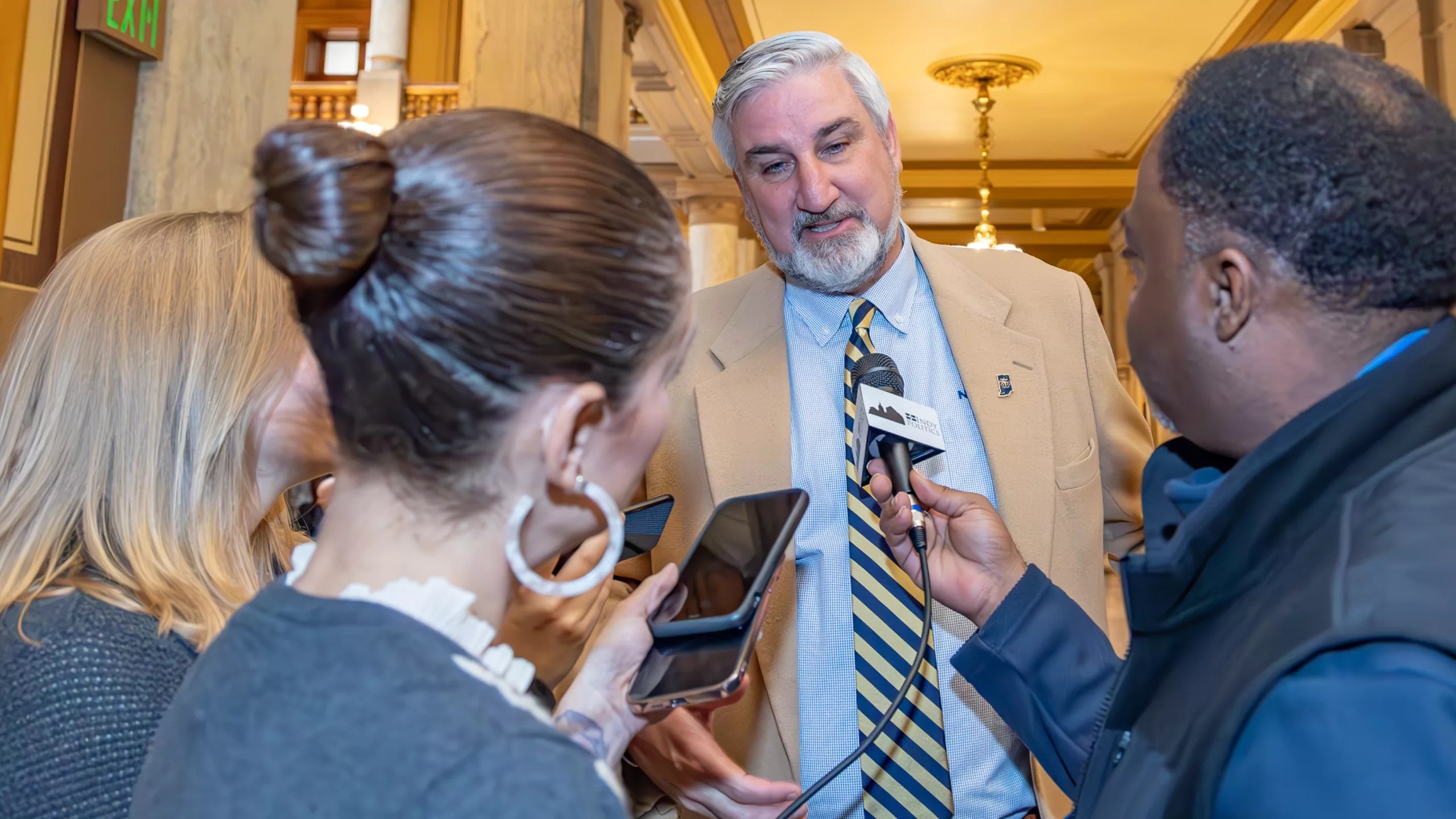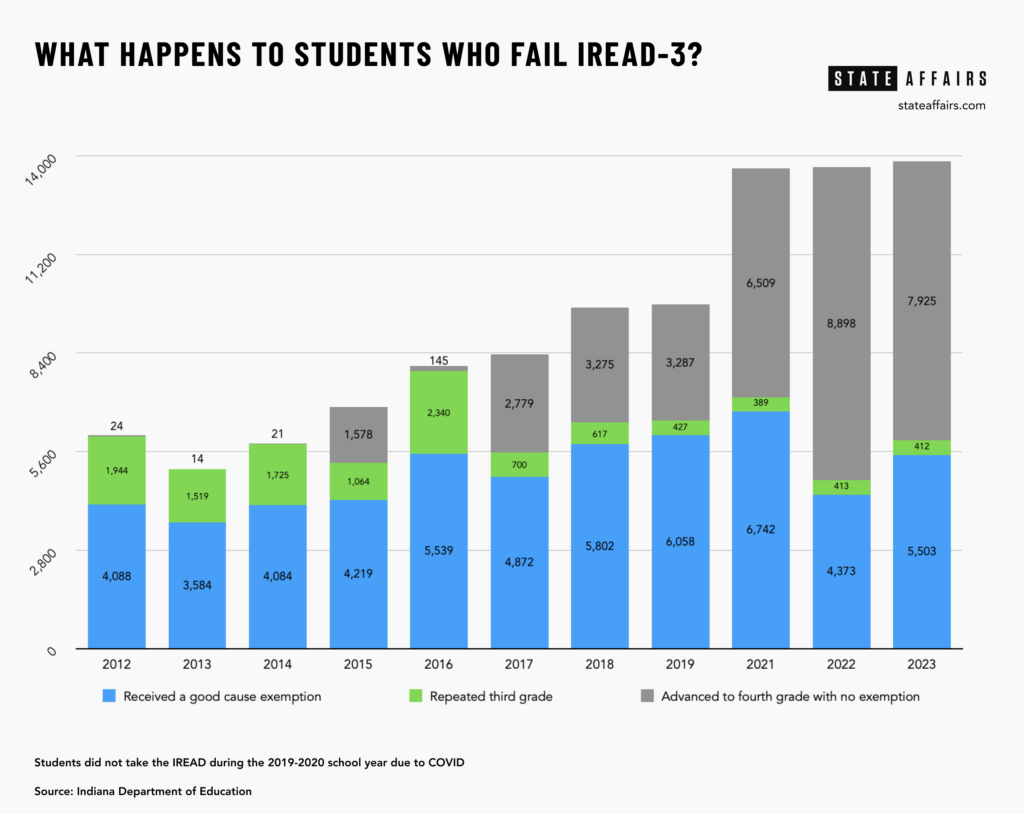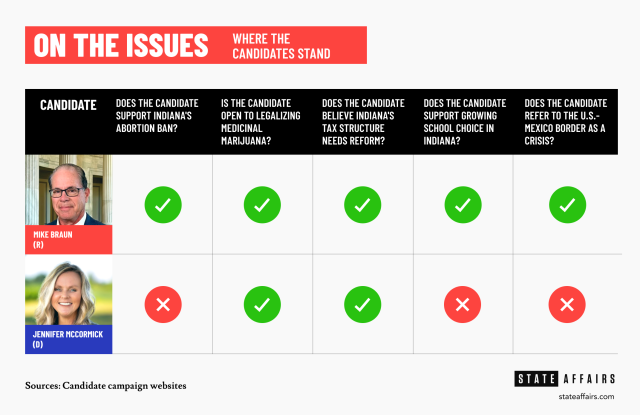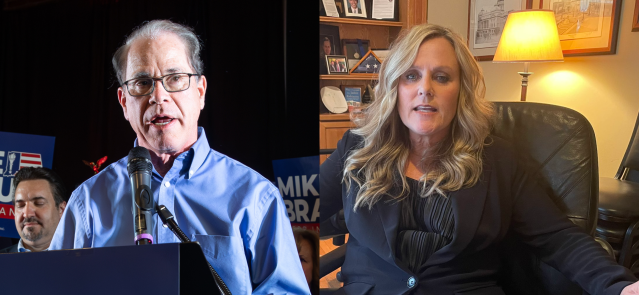Stay ahead of the curve as a political insider with deep policy analysis, daily briefings and policy-shaping tools.
Request a DemoGov. Holcomb unveils plans to hold back more third graders, expand child care access

Gov. Eric Holcomb speaks with reporters following the swearing-in ceremony for Elise Nieshalla as state comptroller on Dec. 1, 2023. (Credit: Mark Curry)
Gov. Eric Holcomb released his plans to grow Indiana’s early child care workforce and increase third grade literacy rates during his legislative agenda rollout on Monday. As a result of his proposal, thousands of third graders could be held back each year.
Holcomb’s agenda unveiled at the Indiana School for the Blind and Visually Impaired marked the start of the 2024 legislative session, his eighth and final while in office. Next January a new governor will replace the term-limited Holcomb.
Lawmakers gaveled in Monday afternoon for session.
“I couldn’t be more excited, quite honestly, about the eighth of eight years and all that we’re going to get done,” Holcomb said Monday. “That’s what taking it to the next level is all about after all is constantly seeking to improve on every front, again to make Indiana the best place to live, work and play.”
Here how Holcomb’s legislative agenda would impact you:
Require schools to hold back more third graders
Students who fail the third grade reading test will be required to retake third grade starting in 2025, unless they qualify for a good cause exemption, such as if they’re an English-Language Learner student or enrolled in special education.
The effort is part of the state’s attempt to increase literacy rates for students. In 2023, nearly 1 in 5 third-graders failed the IREAD-3 test.
“We want to make sure that folks aren’t put at a disadvantage in grades four, five, six and on when they haven’t mastered that reading skill,” Holcomb said. “It’s also been said very simplistically, ‘The more you learn the more you earn.’ And there’s a lot of truth to that.”
Currently, schools largely have the flexibility to pass whomever they want to, even if they fail the IREAD test. As a result, most schools are choosing to hold back few students.

Of the nearly 14,000 third graders who failed the IREAD test in 2023, roughly 400 students had to retake third grade. If all third graders who didn’t qualify for a good cause exemption were held back, close to 8,000 students wouldn’t have advanced to fourth grade in 2023.
Holcomb also wants to require students take IREAD in the second grade, in addition to third grade. Right now, it’s offered to some second graders but not required. In 2023, 771 schools already give second graders the test.Plus, his proposal requires continued testing for any students that fail IREAD in third grade through the sixth grade.
House Minority Leader Rep. Phil GiaQuinta, D-Fort Wayne, threw cold water on Holcomb’s proposal to hold back more students during his opening day speech on the House floor.
“Let’s enact universal pre-K so that all Hoosier children can have a strong educational foundation,” GiaQuinta said. “This will certainly improve our literacy rates — much more than holding kids back and bottlenecking our schools.”
Expand the number of early child care seats
Holcomb’s agenda doesn’t include any new dollars to expand early child care access, but he does recommend multiple legislative changes in order to increase the number of early child care seats in Indiana.
“We need to have more workers,” Holcomb said. “Hopefully we’ll be able to obviously accommodate more kiddos, and then their parents can get back in the workforce.”
One of his proposals would reduce the minimum age of certain early child care employees from 21 to 18 in some cases and 18 to 16 for supervised caregivers. He also wants to make it easier for teachers to serve as substitute caregivers.
His legislative proposals would also enable more early child care employees to qualify for state-funded early child care options. Those employees who make 58% of the state median income would qualify for On My Way Pre-K and Child Care and Development Fund vouchers.
Increase three year degree options
Holcomb wants to require every public university to offer at least one degree that can be achieved in three years.
The goal is to continue to make college degrees cheaper, and entice more students to complete their degrees. Right now, two-thirds of Hoosiers who seek a bachelor's degree finish within six years.
Require students to take a computer science course
If Holcomb’s legislative proposals advance, every high school student will have to take a computer science course in order to graduate starting in 2029.
Currently, 91% of high schools offer a computer science course, but only 7% of students enroll.
“Schools have done an incredible job quite frankly of offering all throughout the state of Indiana,” Holcomb said. “This next logical step of requiring by 2029, so we have time to get there, is in step with the way of the world that is digitally driven.”
Access to state money after an emergency
Another part of Holcomb’s legislative agenda would make it easier for Hoosiers and communities to access disaster relief dollars after flooding, tornados or other natural disasters.
His plan would enable someone to qualify for disaster relief dollars even before the federal government declares a disaster and increase the maximum amount of financial assistance someone can qualify for.
He also would incentivize county leaders ro prepare an emergency plan in advance of a natural disaster by offering them more money for doing so.
“Make it easier for local leaders to respond in the now.”
What’s else?
Holcomb’s agenda also includes the launch of a new one-stop website connecting Hoosiers to jobs and training programs and a commitment to review bail reform efforts and their impact on crime and recidivism rates.
What’s next?
Lawmakers, specifically Republican legislative leaders, are the ones with the power to make Holcomb’s goals a reality. While legislative leaders come from the same political party as Holcomb, they’ve broken with the governor on some items on past wishlists.
This, however, should be a smooth session. Both House and Senate Republicans have said they will support efforts to increase reading proficiency rates, but neither chamber has shared specifics.
In the House Republican agenda rolled out on Monday, legislative leaders said they will support efforts to “make Indiana the No. 1 state in the nation for third grade reading proficiency by 2027.”
Senate Republicans will unveil their legislative agenda on Thursday.
“Senate Republicans share several of the governor’s priorities like expanding access to child care and supporting our students,” Senate President Pro Tem Rodric Bray said in an emailed statement, “especially as it pertains to ensuring our third graders have the foundational reading skills they need to be successful as they progress in school.”
The session will be a fast-paced one. It’s a non-state budget writing year, which means lawmakers must wrap up by mid-March at the latest.
Contact Kaitlin Lange on X @kaitlin_lange or email her at [email protected].
Facebook @stateaffairsin
Instagram @stateaffairsin
LinkedIn @stateaffairs
Read this story for free.
Create AccountRead this story for free
By submitting your information, you agree to the Terms of Service and acknowledge our Privacy Policy.
How this year’s race for lieutenant governor bucks tradition
The usually quiet process of selecting party nominees for lieutenant governor has taken on additional intrigue, as a controversial Republican outsider has challenged the status quo and the Democratic gubernatorial nominee is keeping her options open.
For years, parties have typically rubber-stamped their gubernatorial candidate’s choice for lieutenant governor.
Republican nominee Mike Braun in May announced his choice: state Rep. Julie McGuire, R-Indianapolis. But she will face a challenge from pastor Micah Beckwith, who has campaigned for the nomination for more than a year and claims to have secured support from nearly half of the majority he would need from the party’s 1,800 nominee-deciding delegates.
As Republicans have not lost a statewide election contest in more than a decade, whoever prevails for the lieutenant governor nomination at the June 15 GOP convention will likely become the state’s next number two.
Democrats appear to have a smoother road ahead of their July 13 convention, but gubernatorial candidate Jennifer McCormick has not yet offered up a candidate and recently told State Affairs that “nothing’s off the table,” including selecting a Republican running mate.
Beckwith’s push
Beckwith, pastor of Life Church’s Noblesville campus, told State Affairs he would be campaigning daily for the next five weeks.
“We’re going to try to hit two counties in a day — one in the morning, one in the afternoon. We’ll just be going to county chairs and delegates and letting them ask all the questions,” he said.
He has run for formal office in the past, finishing third in the 2020 Republican primary for the state’s 5th Congressional District. The seat was ultimately captured by Rep. Victoria Spartz.
Beckwith is also a podcast host and may be best known for a tumultuous tenure on the Hamilton East Public Library Board of Trustees, where he pushed for an audit of children’s books. The unpopular plan ultimately collapsed, and the trustees who pushed for it soon left the board.
Beckwith went public with his lieutenant governor candidacy as he left the board and has since barnstormed the state hoping to court potential delegates. His website stresses he is seeking to give Republicans another choice.
Some 1,600 Republican delegates were selected in the May 7 primary election. Every county is represented by a different number of delegates relative to its population, with some fielding only a handful while larger counties field more than 100 each.
Most delegates are elected, but party leaders must sometimes fill vacancies to reach the 1,800 number.
Beckwith said some 400 of the 1,600 newly elected delegates had already pledged to support his bid.
Though Braun selected McGuire, the nominee said last week he welcomed competition for the spot as his running mate.
He told IndyStar: “I think that we’ll win that competition, and if by chance that doesn’t work, which I think is very slim, I’ll deal with it.”
McGuire fits recent trend
McGuire, a one-term legislator from Indianapolis, fits into a recent trend of Republican lieutenant governors: women with legislative backgrounds who represent a different geographical part of the state from their running mate.
Former Lt. Govs. Becky Skillman and Sue Ellspermann and outgoing Lt. Gov. Suzanne Crouch each fit that description.
McGuire defeated state Rep. John Jacob, a staunch anti-abortion activist who clashed with party leadership, in the Republican primary on her way to winning election to the Statehouse in 2022.
She authored one bill signed into law this past session centered on voiding parental rights over children sexually abused by a parent. She co-authored several education bills.
McGuire may be best known as the former author of a proposed bill to block a new tax district in downtown Indianapolis meant to pay for city services. A compromise was ultimately reached to allow the plan. McGuire removed herself as the bill’s author and voted against it.
Braun’s campaign and McGuire did not respond to requests for an interview.
Braun told IndyStar that he recruited McGuire due to her knowledge of health care policy and that he would campaign on her behalf with delegates.
Two state constitutional officers threw their support behind McGuire on Monday: state Treasurer Daniel Elliott and Secretary of State Diego Morales.
“Indiana Republican Convention delegates will have their choice as to who they will support, as do I,” Morales said in an X post. “I will be supporting Julie for Indiana lieutenant governor.”
“Delegates will have a choice at this convention, and I encourage them to choose Julie McGuire as our Republican nominee for lieutenant governor,” Elliott said in a similar post.
Not the first contested race
This year’s competition harks back to the ’90s, when Republican delegates last oversaw several contentious lieutenant governor nomination processes.
In 1996, GOP gubernatorial nominee and Indianapolis Mayor Stephen Goldsmith left the selection entirely up to delegates.
Four years earlier, Attorney General Linley Pearson, the Republican nominee, nearly quit the convention over nominations for lieutenant governor and attorney general that he did not agree with.
Both tickets ended up losing in the general election.
In the ’80s, the GOP experimented with the idea of allowing voters to select the lieutenant governor nominee. John Mutz won a five-way primary in 1980 and eventually served two terms.
Mike McDaniel, a former state GOP chairman who served as Mutz’s campaign manager and chief of staff, said the party returned to the convention system in 1984 because leaders believed a lieutenant governor primary wasted campaign money.
McDaniel, a previous delegate of some 15 state and national conventions, supports the tradition of selecting the gubernatorial candidate’s choice for lieutenant governor.
“I think that’s important because the governor has to serve with this person for four or maybe eight years, and you want somebody you can trust, work with and be part of a team with to get things done,” McDaniel said.
McDaniel called Beckwith’s campaign, launched well before the gubernatorial race came into focus, “very, very unusual.” He said Braun will be the party’s new leader at the convention, so backing his choice is a sign of unity.
“If [Braun] has a preference, we should give him his preference,” McDaniel said.
Holcomb weighs in
More recently, delegates have shown themselves willing to break with the gubernatorial candidate on selections for other constitutional offices. In 2022, the convention chose Diego Morales over Gov. Eric Holcomb’s pick, Holli Sullivan, for the secretary of state nomination.
Holcomb, who briefly served as lieutenant governor under former Gov. Mike Pence, weighed in on this year’s competition on Tuesday, telling reporters that delegates should be the ultimate decision-makers on the nominee.
“And we have a history in Indiana of some tickets being blessed and some not,” he said. “And so that’s very instructive going into this convention and [it’s] incumbent upon the gubernatorial candidate to make their pitch to the convention delegates of their preference. And so I’ve been there, done that. And it worked out OK for me.”
What does a lieutenant governor do?
Whomever the voters select in November will have a role to play in the Legislature and within state agencies.
The lieutenant governor presides over the Indiana Senate and may cast a tiebreaker vote if needed. The position also fills in for the governor if the latter becomes incapacitated or dies.
The lieutenant governor oversees four state agencies: the Indiana State Department of Agriculture, the Indiana Housing & Community Development Authority, the Indiana Office of Tourism Development and the Indiana Office of Community & Rural Affairs.
Finally, the position chairs the Indiana Mental Health Roundtable, the Intellectual and Developmental Disabilities Task Force and the Civics Education Commission.
Democrats prepared to back McCormick’s pick
Delegates for the Indiana Democratic Party are preparing to support their nominee’s pick for governor, Chairman Mike Schmuhl told State Affairs.
“It really falls to [McCormick] to make that selection over the next few weeks,” Schmuhl said, adding that both parties have typically backed the governor’s selection and that Republicans are “upending tradition” with Beckwith’s candidacy.
“We really do envision it as the pick of the gubernatorial nominee,” he said. “Not only is it a convention pick, but it’s also who the governor wants as a governing partner if elected. It’s a pretty serious responsibility.”
Asked about McCormick possibly backing a Republican for the Democratic lieutenant governor nomination, Schmuhl said he could not comment on her process directly.
“I think my recommendation is when you’re picking someone for this spot, you want to find somebody who expands your appeal and your campaign’s reach,” Schmuhl said, “and who doesn’t limit you or harm you in any way.”
Contact Rory Appleton on X at @roryehappleton or email him at [email protected].
Indiana appeals court chief judge on AI, mental health, and the state’s dwindling number of lawyers
Many Hoosiers may be familiar with their local courts or hear about the opinions of the Indiana Supreme Court, but a middle tier in the state’s judiciary system shapes justice through some 2,000 rulings a year.
The 15 judges of the Indiana Court of Appeals dole out opinions on everything from murder and fraud to civil and child welfare cases. Every Hoosier has the right to appeal a conviction or ruling, and the Court of Appeals, the second-highest court in the state, takes up each case sent its way.
Chief Judge Robert R. Altice Jr. has analyzed thousands of cases since being appointed by Gov. Mike Pence in 2015. Prior to that, he spent 15 years as an elected judge in Marion County.
Altice sat down with State Affairs for a discussion on the ins and outs of his court, how changes in technology and mental health care have impacted his work and what he sees as a major problem facing the nation’s judicial system.
This conversation has been edited for clarity, brevity and length.
Q. What sort of cases does the Court of Appeals hear?
A. We hear really everything except death penalty cases. If there’s a death penalty case, it goes straight to the [state] Supreme Court. Otherwise, we get it.
I’ve had to publish an opinion on a traffic court case. About 65% of our cases are criminal. Every, everything under the sun: murders, rapes, robberies, child molestation.
Then there are civil cases. We do medical malpractice suits, traffic accidents, you name it. Complex business litigation? Our court was involved.
Q. How does the appeals process work? There’s not a new trial, right?
A. I’ll give you an example. Let’s say you got a murder case and the defendant gets convicted and gets 65 years, which is the max for a murder conviction. Everybody in the state of Indiana has got an automatic right to appeal. Not everybody takes that right, but most criminal defendants do.
Somebody will write his brief for him. That attorney will find three issues that they think will result in a new trial if we rule in their favor. That’s really what the appellate process is: Are the errors committed at the trial court level significant enough to warrant a new trial?
And then the attorney general in the criminal cases will write a brief in opposition, then the appellant or the defendant can file a reply brief as well.
We sit and read transcripts and their briefs and do our own research and come to a decision as to whether or not there was error at the trial court level that warrants a new trial.
Q. How many of the 2,000 cases your court receives a year, how many are taken up by the Indiana Supreme Court?
A. It is rare. You start with the proposition that trial courts throughout the state are doing about 2+ million cases a year. That’s everything. We do 2,000 opinions a year. I think the Supreme Court writes about 60 opinions a year. That’s what their taking of ours.
But we’re considered an error-correcting court, whereas that’s really not their role. Their role is more jurisprudential. It’s “should we look at changing in this regard or changing precedent.”
It’s really an inverse pyramid, with the trial courts, I always say, doing the heavy lifting.
Our turnaround time is very quick. It’s about three months. Some states require oral arguments in every single case, but we don’t.
If you ask for an oral argument, we will sometimes grant that. We do a lot of oral arguments, but most of our oral arguments are traveling oral arguments. We travel all over the state and do live arguments. And we do those in front of high schools, small colleges, bigger schools.
We answer questions or ask questions like we normally would do, and then once we’re finished, then we have a question and answer session with the students.
Q. One thing we heard about at the State of the Judiciary is there’s an attorney shortage in the state, particularly in rural areas. How has that affected your work?
A. I think we’re seeing more pro se litigants, people representing themselves, and that can be difficult because we hold them to the same standard that we would hold a lawyer to. It can be really difficult for them. So in that regard, it has hurt.
We’ll go to traveling oral arguments in some rural county, and the bar association will host a lunch for us. We’ll go and there’ll be six lawyers in the room and I’ll say to somebody, “So how many people are in the bar?” And they’ll say, “Well, you’re looking at it.”
That access to justice is a really difficult thing that I think the state of Indiana is dealing with now. The Supreme Court has just set up a task force to look into how we can improve that. I believe law schools are looking at incentivizing young kids to go practice in rural areas.
It’s a real issue. I think a lot of it stems from the low bar passage rate of the last 10+ years. It’ll be interesting to see what the task force thinks.
Q. How has technology impacted the court?
A. Technology has been huge. All our work is done online now. The briefs are filed online.
The technology that we have to keep an eye on, and we’re already looking at, is artificial intelligence. What impact is that going to have on the courts, especially our courts?
You can punch a button and write an opinion. It’s probably not going to be very good, but as technology improves, it’s going to be. We’re kind of leery of that.
But at the same time, from a research standpoint, it’s been a very valuable tool. We’ve been using AI in that regard for researching for some time now, with Westlaw and Lexus as they’ve come out with those kinds of tools.
Q. There have been changes in how the world views mental health. How has that impacted the court?
A. I see it primarily in the sentencing arena. Before every defendant is sentenced by a trial court, a pre-sentence investigation is prepared on them. And so that’s where you see a lot of that because it discusses their entire background, and the number of people with mental health issues coming through has really increased greatly.
I think the pandemic had a lot to do with that as well. But again, the mental health issues are very much creeping into the system, and one of the things that we’re constantly working on trying to be aware of and trying to, to the extent we can with alternatives to incarceration, assist people.
Q. Are there any other challenges facing today’s judiciary?
A. I guess not necessarily my court, but courts in general. It appears to me that Congress is broken. They’re not passing laws.
So, what are we doing? We have to rely on the other two branches of government to kind of take up the slack, and that’s why you’re seeing tons of executive orders.
That’s not traditionally their job, and then you’re seeing the courts being called upon to determine whether or not those regulations are enforceable.
I see that as a long-term problem that we’ve got to get corrected.
Contact Rory Appleton on X at @roryehappleton or email him at [email protected].
How McCormick, Braun view abortion, taxes and other key issues
A Democrat-turned-Republican and Republican-turned-Democrat will soon face off in the race to become Indiana’s next governor.
Sen. Mike Braun, who voted as a Democrat prior to 2012, captured the Republican nomination in Tuesday’s primary. Jennifer McCormick, formerly a Republican Superintendent of Public Instruction, will represent the Democrats.
Voters will decide the state’s next chief executive in November.
A State Affairs analysis of the candidates’ campaign platforms and public statements found key differences — and a few similarities — in their planned approaches to a variety of issues impacting Hoosier voters.
Here is how they match up.
Abortion
Braun: As a senator, Braun has long supported abortion restrictions.
In 2020, he called for the Supreme Court to re-examine Roe v. Wade.
In 2023, he proposed federal legislation that would have required parental notification before any unemancipated minor could seek an abortion. He said at the time: “Hoosiers put their trust in me to stand up for the unborn, and that’s what I’ve been proud to do every day in the Senate.”
He has since signaled support for the state’s abortion ban. His platform reads: “State lawmakers must work to ensure the gains we have made to protect life are secured and strengthened.”
McCormick: In a Tuesday interview with State Affairs, McCormick said her candidacy represented a referendum on reproductive rights.
“I’m going to fight to restore those rights under any authority I can, working in a bipartisan fashion, using our committees, board and our agencies. I also know, too, what everybody’s fear is: that they’re [Republicans] not going to restore those rights and will take [restrictions] further.”
From her platform: “Indiana’s Republican-led extreme abortion ban has taken away the right of women to make deeply personal decisions regarding their own health care.”
Marijuana
Braun: At a March 26 Republican primary debate, Braun suggested an openness to legalizing medicinal marijuana.
“It’s gonna hit all of us. I’m gonna listen to law enforcement — they have to put up with the brunt of it,” he said. “Medical marijuana is where I think the case is best made that maybe something needs to change. But I’ll take my cue from law enforcement there as well. … I hear a lot of input where [medical marijuana is] helpful, and I think that you need to listen and see what makes sense.”
McCormick: The Democrat’s platform also addresses medical marijuana legalization, while speculating on possible recreational use.
“We will fight for the legalization of medical marijuana as a source of state revenue established on a well-regulated marketplace and monitored by a Cannabis Task Force in order to study the issues, opportunities and potential obstructions associated with recreational marijuana legalization.”
McCormick said she would also support expunging low-level marijuana-related convictions.
Taxes
Braun: At a March 19 National Federation of Independent Business forum, Braun said the state’s property tax system “went out of whack because it couldn’t respond to inflation like we’ve never seen before.”
“The way you finance any lower taxes would be to bank on the government being run more efficiently,” he said.
His platform also calls for government spending cuts to finance lower taxes: “Reducing the size of government is the key to cutting taxes, and Mike Braun will work through every state agency to find ways to save money while delivering high-quality services to taxpayers.”
McCormick: McCormick also spoke about taxes at the March 19 forum.
“I agree with a revamp of our taxing system,” she said. “But also it’s about not just how we’re getting our revenue, it’s about our expenditures. Yes, we need to fix our gas tax. Yes, we need to look at the income tax. But here’s the thing: There are hidden taxes we’re not having a conversation about.”
Her platform also references the possibility of combining state agencies as a way to save money.
Education
Braun: In his platform, Braun supports broadening school choice and parental rights.
“As a former school board member, Mike Braun knows parents are the primary stakeholders in their children’s education and every family, regardless of income or zip code, should be able to enroll in a school of their choice and pursue a curriculum that prepares them for a career, college or the military,” the platform reads.
Braun also pledged to ensure critical race theory and discussions about gender are banned in public schools.
McCormick: Education is one of McCormick’s primary issues, according to her platform.
She calls for the elimination of statewide testing, increased early childhood reading and child care options and a minimum base salary of $60,000 for all K-12 teachers.
McCormick also addresses the state’s school choice movement.
“We will call for a pause in the expansion of school privatization efforts while requiring fiscal and academic accountability and transparency for all of Indiana schools that receive public tax dollars,” her platform reads.
U.S.-Mexico border
Braun: Braun’s television ads have touched on border security, and his platform calls for increased focus on the area.
“Joe Biden and the left have created a humanitarian and national security crisis on our southern border,” the platform reads. “As governor, Mike will continue to support and enact the America First policies that were working. Otherwise, every town will become a border town.”
McCormick: McCormick’s border-related plans are more focused on facilitating legal immigration.
“We will work with local, state and federal officials in supporting an immigrant system that creates a safe, timely, orderly and humane pathway for those seeking legal immigration while keeping our communities and those responsible for border security safe,” her platform reads.

Contact Rory Appleton on X at @roryehappleton or email him at [email protected].
Spartz, Shreve, Stutzman win Republican congressional primaries
A central Indiana congresswoman successfully fought off eight primary challengers, while crowded races for three other Republican-leaning congressional districts began to clear in Tuesday’s primary election. And in northeastern Indiana, a former congressman held on in a tight race as he seeks to return to Congress. All of the state’s nine U.S. House of Representatives …




